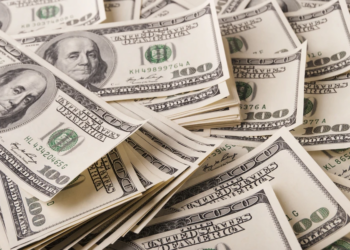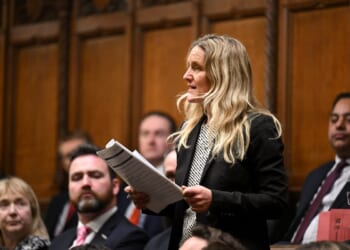The first months of the new Trump Administration have laid bare the web of government technocrats and NGO activists and their public funding. It has never been easier to disregard the narratives these actors have concocted.
Hungarians, then, largely rolled their eyes when Transparency International released its 2024 “Corruption Perceptions Index” earlier this year, and they found themselves tied with Burkina Faso, South Africa, and communist Cuba in the 82nd spot. South Africa’s corruption is manifested in national power outages, a result of theft and mismanagement at the public utility firm. Burkina Faso experienced its last coup d’état in 2023; previous coup attempts occurred in 2022 (two), and each year from 2014 to 2016. The country currently lives under a military regime that has banned French media and contended with jihadist insurgencies.
The assertion that Hungary keeps this company should immediately disqualify these rankings. If corruption existed on the level of Burkina Faso, Cuba, or South Africa, it would color Hungarians’ daily lives — It doesn’t. (RELATED: Lessons for Trump from Orbán, Hungary’s ‘Comeback’ Prime Minister)
According to the 2024 Eurobarometer survey of member states’ corruption perceptions, Hungary ranks seventh in the EU in citizens’ confidence in anti-corruption measures, while Transparency’s list suggests it should rank last. This self-ranking doesn’t prove anything, of course; but corruption doesn’t exist in a vacuum, and a deeply corrupt society inevitably hampers its citizens. Split the difference, if you like, and assume Hungary ranks 17th in the EU in corruption measures. That is not close to Burkina Faso territory.
Similarly, Slovakia — which in late 2023 elected a sovereigntist government in place of an unelected, technocratic placeholder — dropped five points and 12 spots in the 2024 Transparency rankings. Bratislava’s sins during that year included calling for an end to the conflict in Ukraine and criticizing EU mandates on migration and social policies.
Take these rankings for what they are. Transparency International receives much of its funding from USAID, the European Commission, and George Soros’s Open Society Foundation. Governments across the Western world, including most of the highest-ranked, also contribute. (RELATED: Are the Protests in Slovakia Due to NGO and USAID Interference?)
Freedom House, another prominent supplier of these rankings, includes Hungary in the “Partly Free” category of its “Global Freedom Status” score, the only EU country to suffer this indignity. Mexico, Nigeria, Pakistan, and Ukraine share this distinction. The EU hopefuls of the Balkans also rank in the “Partly Free” category, a critical standing as future policy concessions go. The cast of characters funding Freedom House includes USAID, the U.S. State Department, the Open Society Foundation, the Ford Foundation, and governments across Western Europe and Canada.
For an American perspective, consider Freedom House’s “Freedom in the World 2019” report, which depicted President Trump fanning the flames of “democracy in retreat” with the likes of Putin, Xi, and Ayatollah Khamenei. The U.S. State Department partially funded that report.
In its democracy index, the Economist implies a stamp of journalistic integrity, which is arguably suffering a credibility crisis comparable to that of the NGOs. The newspaper, to its credit, is more sweeping in its criticisms: virtually all of Central Europe joins the likes of the United States, France, and Italy as “flawed democracies” in the latest index.
Yet, when “full democracies” like the United Kingdom and Germany are criminalizing speech and seeking to ban opposition parties, one must wonder what a “full democracy” rating signifies. These developing-world antics don’t occur in Belgrade, Bratislava, or Budapest. As is often the case, the positive-coded term “democracy” obscures the true subject at hand – liberalism. (RELATED: Letter to the Editor: A Report From Germany — Censorship and Hope, Vance’s Speech in Munich)
These rankings rest on the dual assumptions that democracy must look a certain way (read: progressive-liberal) and corruption must look a certain way (anti-liberal). On both counts, public figures named Clinton, Biden, and von der Leyen are subject to a more favorable set of rules.
Even explicitly right-leaning metrics warrant some skepticism. The Heritage Foundation’s “Index of Economic Freedom” ranks Ireland number three, for example. Observers in Dublin, Washington, and beyond have noted the country’s economy is a house of cards built on American multinational tax arrangements. Careless jabs at the new Trump administration, profligate government spending, and runaway immigration all point to the pain ahead for Dublin — and that would be the second time in less than two decades. The assertion that Irish economic principles are worth emulating is dubious. (RELATED: Ireland Imposes Draconian ‘Hate’ Laws)
Far more than national pride is on the line when these freedom and democracy rankings make their annual appearance. For EU members, these contain increasing financial relevance. Brussels can point to unfavorable findings from NGOs that it partially funds and withhold financial disbursements to member states with sovereigntist governments.
Hungary is currently enduring these financial penalties, and Slovakia is on notice. Poland was subject to these maneuverings until it elected a government led by former European Council President Donald Tusk in 2023; Brussels removed the sanctions even before the new government enacted any legislation. (RELATED: Poland Continues to Arrest Political Opponents)
For a non-EU member like Serbia, these are reminders that the economic benefits of membership come with a social price tag. Sign on to migration schemes and NGO activities in schools, and elect pliable liberal governments, or remain outside the club. Serbia’s democracy metrics — and, thus, its achievement of EU accession criteria — hinge on matters like these. A 2024 European Parliament report on Serbia, predictably, cites the Freedom House ranking as one of its reasons for concern.
These rankings are omnipresent and enjoy a veneer of respectability. For speechwriters, policy analysts, advisers, and politicians themselves, it is far easier to take them at face value than to stay abreast of events in every region of the world. Nor is this limited to Washington. The business community also leans on these reports to ascertain whether something is rotten in the state of Denmark (number one on Transparency International’s list).
By all means, highlight corruption in Central Europe, the United States, and everywhere else it exists. Advocate for democratic resilience in its true meaning. These oft-cited rankings, though, are merely guardrails for the liberal order. As with the USAID nation-building projects that have garnered headlines lately, taxpayer dollars ought not to keep them afloat.
Much work lies ahead, as exemplified in this National Endowment for Democracy (NED) press release celebrating a partial restoration of its funding. Having won a short-term battle over the Trump Administration, NED vows to “begin stabilizing operations and resume grantmaking.” As long as organizations like these are allowed to define friend and foe, our activist nation-building will continue.
READ MORE from Michael O’Shea:
Poland Continues to Arrest Political Opponents
The Lies Are No Longer Uttered with Impunity: Vance’s Speech and Poland’s Crucial Election
Are the Protests in Slovakia Due to NGO and USAID Interference?
Michael O’Shea is an American-Polish writer and translator. He is a Danube Institute Visiting International Fellow.





![Trump's Admin Guts Another ‘Rogue Government Agency with Zero Accountability’ [WATCH]](https://www.right2024.com/wp-content/uploads/2025/03/Trumps-Admin-Guts-Another-‘Rogue-Government-Agency-with-Zero-Accountability-350x250.jpg)



![‘We All Owe Him (Elon) a Huge Debt of Gratitude’ [WATCH]](https://www.right2024.com/wp-content/uploads/2025/03/‘We-All-Owe-Him-Elon-a-Huge-Debt-of-Gratitude-350x250.jpg)







